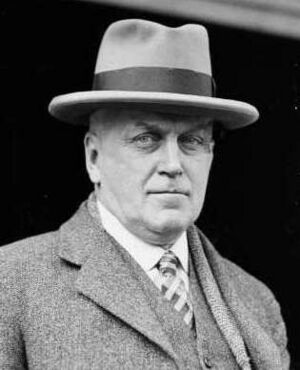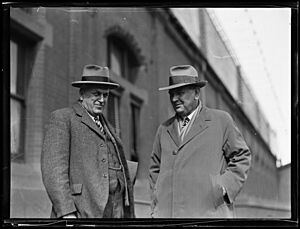Arthur Edward Moore facts for kids
Quick facts for kids
Arthur Edward Moore
|
|
|---|---|
 |
|
| 23rd Premier of Queensland Elections: 1929 |
|
| In office 21 May 1929 – 17 June 1932 |
|
| Monarch | George V |
| Governor | John Goodwin Leslie Wilson |
| Preceded by | William McCormack |
| Succeeded by | William Forgan Smith |
| Leader of the Opposition in Queensland | |
| In office 17 June 1932 – 15 July 1936 |
|
| Premier | William Forgan Smith |
| Preceded by | William Forgan Smith |
| Succeeded by | Ted Maher |
| In office 19 April 1924 – 11 May 1929 |
|
| Premier | Ted Theodore William Gillies William McCormack |
| Preceded by | Charles Taylor |
| Succeeded by | William Forgan Smith |
| Member of the Queensland Legislative Assembly for Aubigny | |
| In office 22 May 1915 – 29 March 1941 |
|
| Preceded by | Alfred Luke |
| Succeeded by | Walter Sparkes |
| Personal details | |
| Born |
Arthur Edward Moore
9 February 1876 Napier, Colony of New Zealand |
| Died | 7 January 1963 (aged 86) Brisbane, Queensland, Australia |
| Nationality | Australian |
| Political party | CPNP |
| Other political affiliations |
|
| Spouse | Mary Eva Warner |
Arthur Edward Moore (9 February 1876 – 7 January 1963) was an important Australian politician. He served as the Premier of Queensland from 1929 to 1932. He was a member of the Country and Progressive National Party. For a long time, he was the only Premier of Queensland who was not from the Labor Party. Moore faced big challenges when the Great Depression hit, which made his time as Premier very difficult.
Contents
Early Life and Political Start
Arthur Moore was born in Napier, New Zealand, in 1876. His family moved to Australia in 1887, settling in Melbourne. In 1898, Moore moved to Queensland. There, he became a dairy farmer in the Darling Downs area. He also owned two cheese factories.
Moore started his political career in local government. In 1905, he became a member of the Rosalie Shire Council. He was the chairman of this council from 1911 to 1929. He also led the Queensland Local Authorities Association.
Joining the Queensland Parliament
In 1915, Moore was elected to the Legislative Assembly of Queensland. He represented the Farmers Union, which was an early version of the Country Party. This election saw the Labor Party win power.
At this time, the non-Labor political groups in Queensland were not working well together. The Country Party often disagreed with other groups like the Queensland Liberal Party. These disagreements made it hard for them to win elections.
Becoming a Leader
By 1920, Arthur Moore became the Deputy Leader of the Opposition. The different non-Labor parties slowly started to work together. In 1924, Moore was chosen as the Leader of the Opposition.
In 1925, the Country and United parties joined to form the Country Progressive Party. Later that year, they changed their name to the Country and Progressive National Party (CPNP). In the 1926 elections, the CPNP gained many seats. Finally, in 1929, Moore led the CPNP to a big victory. He became the Premier of Queensland.
The Moore Government and the Great Depression

Soon after Moore became Premier, the Great Depression began. This was a very difficult time for the economy in Australia and around the world. Moore's government had to deal with its harsh effects.
Moore tried to fix the economy by reducing government spending. He also tried to lower wages and worker benefits. To help the state's money problems, he introduced an income tax. This tax made some of his supporters unhappy.
Challenges and Changes
In 1931, Moore faced more challenges. There were disagreements within his own party. These arguments were about bringing back the Legislative Council, which had been removed in 1921. Moore also faced criticism from a newspaper called the Brisbane Courier.
During his time as Premier, Moore also changed the boundaries of the electoral districts. This meant that the number of seats in the Legislative Assembly was reduced. Many people accused him of doing this to help his own party win more votes.
In 1932, Moore started an official investigation into former Labor Premier Ted Theodore. This investigation looked into claims of corruption. Some people believed Moore used this investigation to harm the federal government, which was led by the Labor Party.
The 1932 elections showed that Moore's party had lost support. The Great Depression and ongoing arguments within his party led to their defeat. The Labor Party, led by William Forgan Smith, won the election.
After Being Premier
After the defeat, Arthur Moore continued to lead the CPNP. However, the party suffered another big loss in the 1935 election. After this, the CPNP split into different groups. Many rural members formed the Country Party again.
Members of the Country Party believed Moore was responsible for the 1935 loss. They asked him to step down as leader. Moore agreed and was replaced by Ted Maher. Moore remained an important member of the opposition until he retired from politics in 1941.
Arthur Moore passed away in 1963. He was given a special state funeral in Brisbane at St John's Anglican Cathedral. He was later cremated.
See Also
- Moore Ministry (Queensland)
 | John T. Biggers |
 | Thomas Blackshear |
 | Mark Bradford |
 | Beverly Buchanan |

